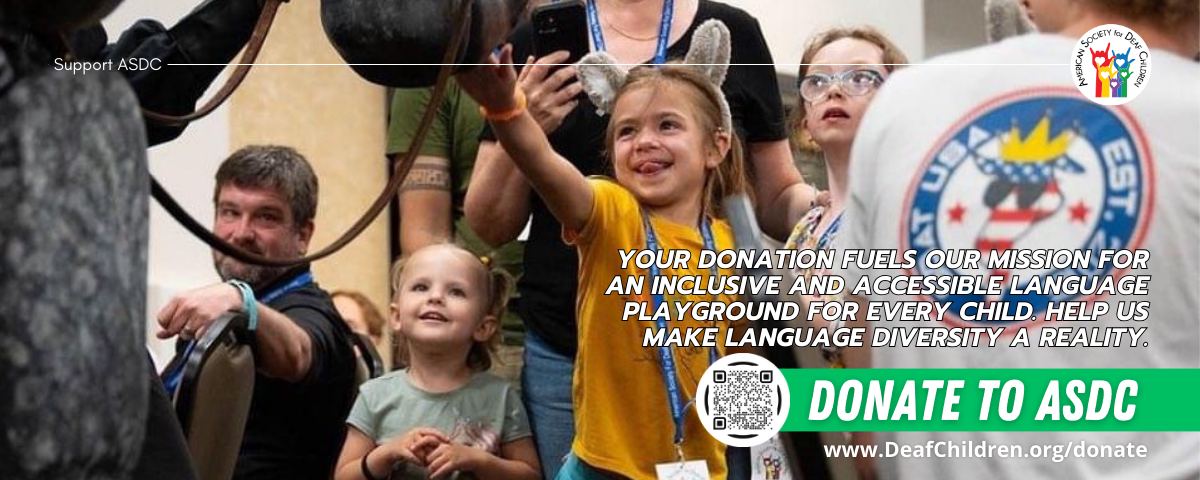
ELECTION DAY 2024
As Election Day 2024 arrives, many parents, educators, and advocates are reminded of the power we hold to shape our children’s futures through our votes. For families of Deaf, Hard of Hearing, and Deaf-Blind (D/HH/DB) youth, voting is more than a civic duty—it’s a chance to ensure that leaders prioritize accessibility, language rights, and resources crucial for our children’s growth and success.
Here’s why it’s essential to make your voice heard and how voting can influence policies that impact D/HH/DB communities:
1. The Voting Power of the Disability Community
Did you know that approximately 40.2 million Americans with disabilities are eligible to vote in the upcoming elections? This number surpasses the population of eligible Hispanic/Latino and Black voters combined, showing the significant impact that the disability community can have on election outcomes. (Source: Verywell Health)
However, turnout among voters with disabilities still lags behind the general population. If people with disabilities voted at the same rate as those without disabilities, there would be an estimated 1.75 million more votes—enough to sway policies and ensure that issues impacting the disability community receive the attention they deserve. (Source: Rutgers Program for Disability Research)
2. Barriers to Voting
Despite the significant size of the disability voting bloc, barriers persist. In the 2022 elections, 14% of voters with disabilities reported experiencing difficulties in voting, compared to just 4% of voters without disabilities. These challenges highlight the need for continued advocacy to make voting fully accessible, whether through physical accommodations at polling places, accessible ballots, or voting assistance. (Source: Kessler Foundation)
By voting, we can push for leaders who support policies that make voting easier and more inclusive for all.
3. Addressing Issues Overlooked in Political Campaigns
Key issues such as accessible education, language equity, and community resources often receive limited attention in political campaigns. Advocacy groups emphasize that candidates must recognize and address the unique needs of the disability community to impact electoral success. As voters, we can choose representatives who prioritize policies that align with the needs of D/HH/DB families and drive change for our community. (Source: WHYY)
4. Why Parents, Educators, and Advocates Should Vote
For D/HH/DB youth under 18 who cannot yet vote, parents, educators, and advocates play an essential role in representing their voices. Voting for candidates who support accessibility, inclusivity, and language rights is a step toward creating a world where every child, regardless of hearing level, has the resources and opportunities they need to thrive.
Here’s how our votes can shape the future:
- Advocate for Accessibility: By electing leaders who understand the importance of accessible resources, we can help create environments that allow D/HH/DB youth to learn and grow without barriers.
- Support Language Rights: Voting for representatives who champion language equity ensures that communication access is a priority, allowing D/HH/DB children to communicate, learn, and succeed.
- Build a Better Tomorrow: Casting our ballots today lays the foundation for an inclusive future where all children, regardless of their hearing level, can thrive and achieve their full potential.
Make Your Voice Heard
Election Day is an opportunity to make sure the needs of D/HH/DB children are represented. Let’s exercise our right to vote and elect leaders who will work toward a world where every child has the chance to succeed.
Together, through our votes, we can help build a future where inclusivity, accessibility, and language rights are the standard—not the exception.
Citations:
Verywell Health. “Voters With Disabilities Face Challenges in Presidential Election 2024.” Retrieved from Verywell Health.
Rutgers Program for Disability Research. “Fact Sheet on Disability Voter Turnout in 2022 Elections.” Retrieved from Rutgers Program for Disability Research.
Kessler Foundation. “NTIDE September 2024 Voting Data Reflects Increased Turnout for People with Disabilities.” Retrieved from Kessler Foundation.
WHYY. “Voters with Disabilities Call for Representation on the Ballot in 2024.” Retrieved from WHYY.
Helping Your Kids Understand the Election Day Process



